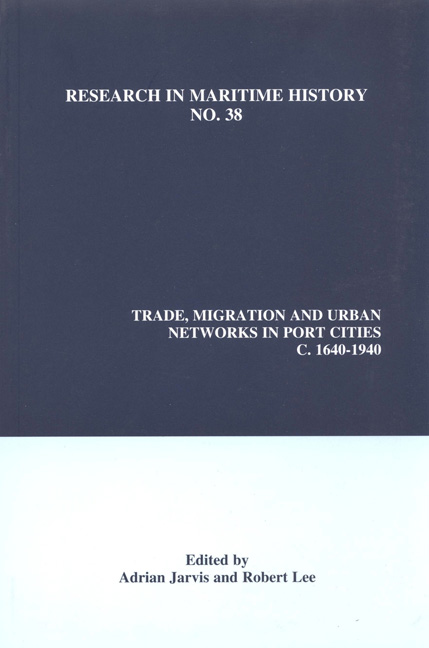Book contents
- Frontmatter
- Table of Contents
- Contributors' Notes
- “Trade, Migration and Urban Networks, c. 1640-1940: An Introduction”
- “Portuguese Jews in Amsterdam: An Insight on Entrepreneurial Behaviour in the Dutch Republic”
- “Contrasting Merchant Communities in the Early Eighteenth Century: Stockholm, Calabar and Charleston”
- “Integration of Immigrant Merchants in Trondheim in the Seventeenth and Eighteenth Centuries
- “In the Eye of the Storm: The Influence of Maritime and Trade Networks on the Development of Ostend and Vice Versa during the Eighteenth Century”
- “Exploiting International Webs of Relations: Immigrants and the Reopening of the Harbour of Antwerp on the Eve of the Nineteenth Century”
- “Migrants, Merchants and Philanthropists: Hierarchies in Nineteenth-Century Greek Ports”
- “Port Cities, Diaspora Communities and Emerging Nationalism in the Ottoman Empire: Balkan Merchants in Odessa and Their Network in the Early Nineteenth Century”
- “Combining Business and Pleasure? Cotton Brokers in the Liverpool Business Community in the Late Nineteenth Century”
“Migrants, Merchants and Philanthropists: Hierarchies in Nineteenth-Century Greek Ports”
- Frontmatter
- Table of Contents
- Contributors' Notes
- “Trade, Migration and Urban Networks, c. 1640-1940: An Introduction”
- “Portuguese Jews in Amsterdam: An Insight on Entrepreneurial Behaviour in the Dutch Republic”
- “Contrasting Merchant Communities in the Early Eighteenth Century: Stockholm, Calabar and Charleston”
- “Integration of Immigrant Merchants in Trondheim in the Seventeenth and Eighteenth Centuries
- “In the Eye of the Storm: The Influence of Maritime and Trade Networks on the Development of Ostend and Vice Versa during the Eighteenth Century”
- “Exploiting International Webs of Relations: Immigrants and the Reopening of the Harbour of Antwerp on the Eve of the Nineteenth Century”
- “Migrants, Merchants and Philanthropists: Hierarchies in Nineteenth-Century Greek Ports”
- “Port Cities, Diaspora Communities and Emerging Nationalism in the Ottoman Empire: Balkan Merchants in Odessa and Their Network in the Early Nineteenth Century”
- “Combining Business and Pleasure? Cotton Brokers in the Liverpool Business Community in the Late Nineteenth Century”
Summary
Introduction
The growth and decline of nineteenth-century port cities has been the subject of considerable research in a comparative European context, and their role in European urban development has been established. Related research has also shown the roles of merchants as economic and social actors in Mediterranean ports. This essay draws on research on the port of Corfu during the period of British rule (1815-1864) and on histories of other ports in the Greek kingdom, especially Patras, Syros (Ermoupoli) and Piraeus. Most studies of these ports aspire to be comprehensive urban histories and focus on demography, social structure, port development and growth rather than issues of urban networks and hierarchies. Still, an examination of this literature shows that despite diverse characteristics and differences in the timing of the process of elite formation, a similar methodology can advance our understanding of how networks of power developed in all the ports. The diverse composition of the various Greek ports due to in-migration is described first. The essay then demonstrates how the synergy between merchants and state authorities – evident in the emergence of commercial institutions – created new mercantile hierarchies. In addition to those that derived from wealth, commercial activity and access to resources; new networks were developed based upon factors such as the ability to raise capital and to gain access to information. The last part of the essay examines the role of merchants as philanthropists in response to real and perceived threats to urban life.
Demographic and Cultural Characteristics of Port Cities
As Robert Lee has argued, “a key feature of the demographic development of major port cities was a disproportionate dependency on in-migration.” The examples of Ermoupoli, Piraeus and to some extent Corfu suggest that this was true in Greece as well. The population growth of Ermoupoli – and in the period 1835-1870 of Piraeus as well – was a result of planned development, an influx of refugees from Crete and rising fertility rates. These were essentially new towns. In-migration from other islands was due to the needs of the nascent Greek economy, which was extremely dependent on ports for the export of agricultural produce and the import of manufactured and other goods.
- Type
- Chapter
- Information
- Trade, Migration and Urban Networks in Port Cities, c. 1640–1940 , pp. 109 - 126Publisher: Liverpool University PressPrint publication year: 2008



